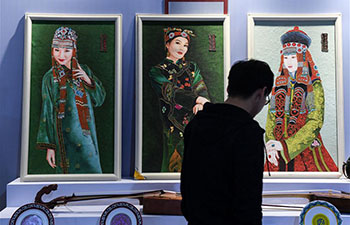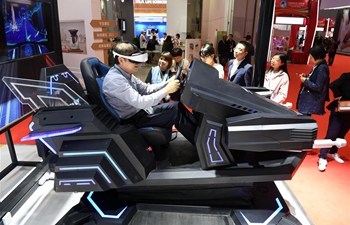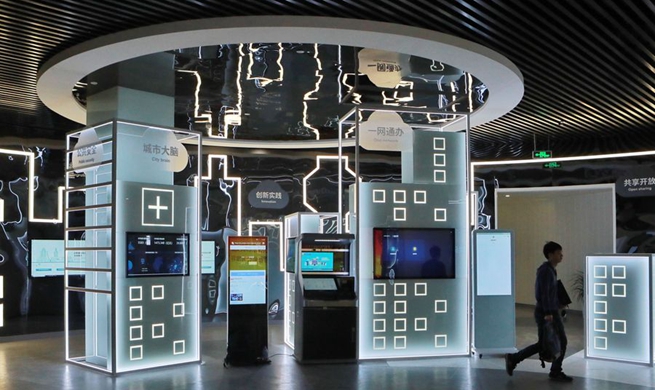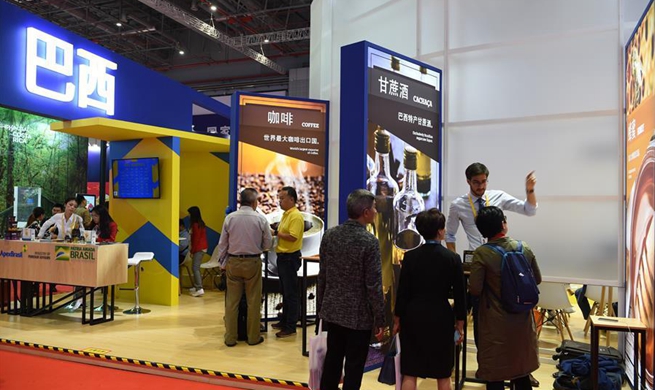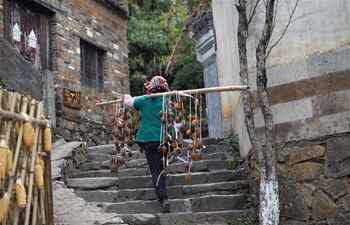SHANGHAI, Nov. 7 (Xinhua) -- With the world economy mired in sluggish growth, China's increasingly prosperous market of 1.4 billion and greater opening steps are what global businesses cannot afford to miss.
Tapping into the market, nearly 3,900 companies from around the world flocked to Shanghai for the second China International Import Expo (CIIE), the hosting of which is part of China's bigger drive to open up its vast domestic market.
The expo, set to run from Nov. 5 to 10 this year, offers a marketing platform for overseas goods and services ranging from fruits, cosmetics and excavators and financial services, welcoming newcomers as well as established market players.
"China will open its door only wider to the world," Chinese President Xi Jinping said at the opening of the import expo, which was attended by foreign leaders including French President Emmanuel Macron, Greek Prime Minister Kyriakos Mitsotakis, Jamaican Prime Minister Andrew Holness and Serbian Prime Minister Ana Brnabic.
Last year, more than 3,600 companies attended the CIIE, agreeing on some 57.83 billion U.S. dollars of deals in one week.
China will better leverage the fundamental role of domestic consumption in economic development and foster a more robust domestic market to boost growth at home and create more room for global growth, Xi said.
The country has unveiled a host of measures to increase market opening and improve the business environment, including cutting tariffs, shortening the negative list for foreign investment and gradually easing the ownership caps of foreign investors in sectors such as auto manufacturing, brokerage and insurance.
Among its latest move to encourage foreign investment, the country scrapped investment quotas on the Qualified Foreign Institutional Investors (QFII) scheme and its yuan-denominated sibling RQFII.
Although China's growth slowed amid the global economic downturn and trade frictions, its consumer spending maintained steady expansion as Chinese people's appetite for quality goods and services continued to grow.
Retail sales, a main gauge of consumption, increased 8.2 percent year on year in the first three quarters of the year.
Calling China "a country full of opportunities," Bertrand Austruy, general secretary and executive president of Danone, a world-leading food company, said the CIIE provides a unique opportunity to bring quality products from around the world to Chinese consumers.
As the company's second-largest regional market in the world, China contributed 9 percent of Danone's global sales last year.
"The openness of the trade environment in China, the development of e-commerce and the establishment of free trade zones have enabled Danone to bring the best products to China very fast," Austruy said.
It introduced over 120 products to this year's expo, among which nearly 10 are new to the Chinese market. A year before the 2020 CIIE, Danone, together with more than 100 other companies, have signed up for the event.
"The CIIE provides us a good opportunity to showcase our food innovations that can answer the needs of new-generation Chinese who possess high-purchasing power and tend to increasingly demand more imports," said Prasit Boondoungprasert, chief executive officer of Charoen Pokphand (CP) Foods PLC.
The Thai food company exhibited fresh and processed food products at the expo, including pork, chicken and fresh shrimp. One of the products, U Farm-branded premium chicken, will be introduced to the market after the expo.
Considering China's slower growth a short-term situation, Prasit said "we are not concerned about the Chinese economy. Everything is so far so good in the market now. Economic growth always has ups and downs. Businesses can adjust, adapt and find new opportunities."
Prasit spoke highly of China's transportation network and growing anti-corruption efforts, saying the company plans to expand investment in China to boost production of eggs, chicken and pork.
The company's parent group, the Thai conglomerate CP Group, was among the first foreign companies to enter China after the country adopted its opening-up policy in the 1970s. Benefiting from the expansion of the Chinese market, it has established over 400 enterprises in various sectors in the country.
"Reform and opening-up is a game-changing move that has made China what it is today," said David Ko, head of audit with KPMG China. The frequency with which China has issued new opening-up measures demonstrates the country's firm determination to open up wider, he said.





